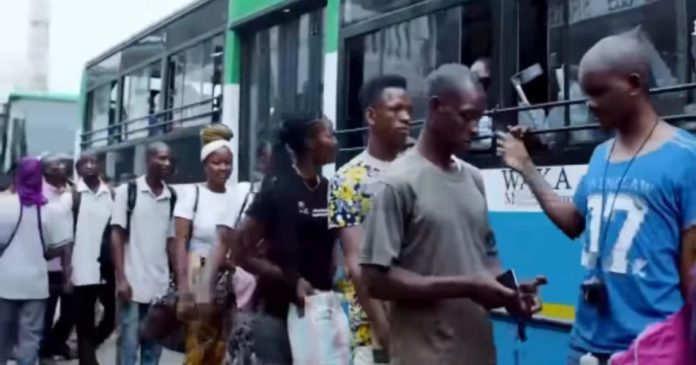By Ishmael Dumbuya
Following the launch of the 50 new buses in Freetown by the Ministry of Transport and Aviation meant to ease the challenges in the transport sector, many Sierra Leoneans have raised varying questions and concerns regarding the ticket price and the movements of the buses.
On that note, Concord Times conducted random interviews yesterday on the streets on Freetown asking questions on the operations of the new buses. This medium learnt that there are a lot of resentment and challenges with the operations of the buses and the backlash of the ticket prices.
According to people I spoke to on the streets, they expressed disappointment at the prices of the ticket, adding that the government’s price is supposed to be minimal as compared to the private transports.
Some people mentioned that with the bus price at NLe. 10, it will urge other private transports to equally increase their own prices. Yesterday people at Calaba Town paid the same 10Le. on private buses as it’s paid on the new buses. Also, the tickets are now being sold in the streets, and it appears that anyone can buy them in bulk and sell them individually. While this may increase accessibility, it also opens the door for counterfeit tickets being sold to unsuspecting passengers. It’s therefore good for the government to implementing a digital payment system such as Mobile Money or a transit payment card that can be loaded and swiped upon entering the bus. This would not only prevent ticket fraud but also provide a more convenient and efficient way for passengers to pay.
Another concerned raised is the route. Since the new buses came, private transports have been designed to ply the old roads which are normally untarred and dilapidated, whereas, the new buses are made to ply the new roads.
Another concern is the cleanliness of the buses. Trashcans should be installed in all the buses, and staff should be stationed at the bus stations to collect the trash after every round trip. This would help maintain a clean and comfortable environment for passengers.
The conductors should be required to wear uniform, such as a customized t-shirt representing the community managing the buses. They should also be well-groomed and treat passengers with professionalism and respect.
To enhance passengers’ overall experience, installing free WiFi systems and real-time tracking on the buses would be beneficial. This would allow passengers to browse the internet after watching advertisements for a certain period.
Considering the limited road infrastructure, it may be worth exploring the possibility of constructing special road corridors dedicated to buses in the future. In the meantime, efforts should be made to improve the bus stops and ensure that they are big enough to accommodate large numbers of passengers.
The current bus station in central Freetown must be upgraded. If the government does not have the funds for a complete facelift, it could consider partnering with the private sector to construct a building that includes transit areas, restaurants, toilet facilities, and shopping outlets. Renting out these spaces to private businesses would also generate additional revenue.
The 50 new public service buses were given under the Resilient Urban initiative, a collaboration between the World Bank and the Sierra Leone Government to address transportation needs in Freetown.
Hindolo Shaka, Director Ministry of Transport and Aviation, maintained that, the Nle 10 paid by passengers is not for the entire day using the buses; rather it serves as a one-way payment.
He added that they have to introduce the card system that will ease the payment process and the installation of the card machines may start in March this year, adding that, the paper ticket payment might still be in session even when the card system may start operating to help individuals that do not have the card and those coming to Freetown from the provinces and overseas for a short period of time.
He maintained that, the pending cards would be recharged through Orange or Africell Money or at the Bus stations.
The 50 buses were made by Ashok Leyland in India – a multinational company known for producing strong and reliable buses.





